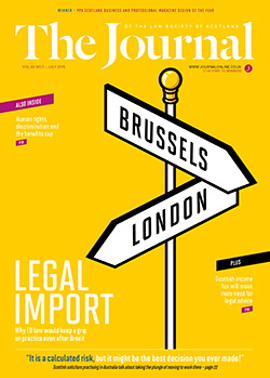Mind games

The provisions relating to the income tax powers of the Holyrood Parliament are now spread across three legislative documents. The Scotland Act 1998 was amended by the Scotland Act 2012, and the 2012 Act amendments are themselves partially amended by the bill. It is therefore important to understand the way in which the income tax provisions of the 2012 Act operate, to understand the changes made by the bill.
The 2012 Act empowered the Scottish Parliament to set a single Scottish rate of income tax. The UK rates of income tax would be reduced by 10 percentage points, and the single Scottish rate would be applied uniformly across all of the rates. This was intended to devolve taxation powers to the Scottish Parliament, whilst preventing too much divergence from the rest of the UK and too much of a change in policy as to which earners ought to bear the burden of the income tax take.
Where to draw the line
The bill provides much more flexibility to the Scottish Parliament. Section 80C of the 1998 Act is amended so that the Scottish Parliament may, in its “Scottish rate resolution”, set any number of rates of income tax across any number of bands. The Scottish Parliament would be able to increase or reduce the rate paid by higher earners while also increasing or reducing the rate paid by lower earners. It would also be able to change the point at which a taxpayer starts to pay each rate and indeed, by introducing a zero rate band, the point at which a taxpayer pays any income tax at all on their relevant income.
The bands and rates set by the Scottish Parliament will be relevant only to Scottish taxpayers, and they will apply only to the income set out in s 11A of the Income Tax Act 2007, being “earned income” – effectively all income except interest and dividends. The Scottish Parliament will have no power to subdivide earned income into different categories charged at different rates.
The provisions about when a person will be a “Scottish taxpayer” have not changed from those set out in the 2012 Act, and HM Revenue & Customs has published guidance on the way in which the rules will be applied. This guidance is helpful in that it seeks to clarify the meaning of “place of residence”, which is not defined in the legislation, and it includes some practical examples which may assist when providing advice.
To be a Scottish taxpayer, a person must first be UK-resident for income tax purposes. He or she must then look at ss 80D to 80F of the 1998 Act which, broadly speaking, provide that a person will be a Scottish taxpayer if (1) his or her only or principal place of residence (read “home”) is in Scotland, or (2) he or she spends more time in Scotland than in any other part of the UK, or (3) he or she is an elected representative for a Scottish constituency.
Upside, downside
There are definitely positive aspects to the bill’s income tax provisions. Democratically, it will make the Scottish Parliament more accountable for its decisions on public spending and there will be a clearer link between the revenue-raising and spending policies of the Scottish Government. It makes sense that a legislature that has control over a number of large-spending areas of public administration in Scotland should have some responsibility for the way in which revenue is raised in order to meet those spending commitments. It is unsustainable for Westminster and Holyrood to be able to continue to blame the other for either overspending or underfunding, and these provisions go some way to alleviating that.
A negative aspect of the bill’s provisions is that they very much increase the burden on Scottish taxpayers. Their personal taxation will become the most complicated in the UK. Not only will part of their income still be subject to UK rates of income tax (already regarded as being some of the most complicated tax legislation anywhere in the world), but there will now also be an additional layer of computation required for the remainder of their income. The scope for errors being made by those who are in the self-assessment regime will widen significantly.
It should also be remembered that the rate at which a person pays capital gains tax is now linked to his or her income tax rate. Because capital gains tax remains a reserved tax, the determination of a Scottish taxpayer’s rate of capital gains tax will still be carried out by reference to the UK rates of income tax. The complicated web of legislative provisions that affect Scottish taxpayers continues to grow ever denser!
It is undoubtable that Scottish taxpayers, particularly those within the self-assessment regime and those whose income is derived other than from employment, will require an increased amount of professional advice in the coming years as the practical implications of the provisions become clearer.
Pointers please
We cannot be sure at this stage about the way in which the powers will be used, but political appetite in Scotland has tended to sway towards increased levels of public spending. Given that, it would appear safe to assume that tax rates in Scotland are not about to fall significantly, but nor is there any indication from any political party that they are suddenly about to rocket.
During the Westminster legislative process, amendments to the provisions will be tabled, debated and accepted or rejected, but the way in which the provisions will operate is unlikely to change significantly. On that premise, it would be of significant benefit to Scottish taxpayers (and their advisers) if Scotland’s political parties began to discuss in detail the way in which they would use the powers. This would remove some of the uncertainty that is becoming increasingly prevalent when speaking to clients, especially those with more complicated income positions.
It is expected that the provisions will be enacted in time for the Scottish Government to issue its first Scottish rate resolution ahead of the 2016-17 tax year. A Scottish Parliament election is due to take place around the same time, so there will be a significant public platform from which the use of the provisions can be discussed and debated.
Trust complications
A matter of particular concern for private client advisers will be the way in which income passing through trusts and to their beneficiaries will be subjected to income tax. At the moment, the position remains unclear.
Currently, income paid to the trustees of a discretionary trust is subject to income tax in their hands in accordance with its type (e.g. rental income is “earned income” whilst dividend income is “dividend income”), and the appropriate trust rates are applied. It is important to note that the trust rates are not affected by the bill’s provisions, as they are set by a separate section of the Income Tax Act 2007.
When trust income is distributed to a beneficiary, it loses its earlier character and is treated as earned income in the beneficiary’s hands with a matching tax credit for the tax paid by the trustees. For trust income from dividends, the trustees will pay the trust rate applicable to dividends. The trustees will then distribute that income as earned income with a credit at the UK rate when it is paid to the beneficiary. If that beneficiary is a Scottish taxpayer after April 2016, the tax credit may bear no resemblance to his or her personal rates of income tax.
Calculating how much income can be distributed without pushing a beneficiary into a higher rate of tax then becomes significantly more complicated, and standard trust administration begins to require consideration of matters that are usually only relevant when dealing with offshore or international structures. As a result, it should be expected that the administration costs of trusts will increase.
There are related considerations when it comes to income passing through and paid from liferent trusts, and HMRC has sought to deal with the issue of trust income in a broad manner by publishing two technical papers. These papers are helpful to an extent, but taxpayers should not need to rely on guidance from HMRC, which is subject to change, when seeking to structure their personal affairs. The extent of a person’s tax liability should be clear and should be assessable and that requires legislation. At the moment, the provisions create a situation where taxpayers will be forced into tribunals in order to have their assessments reviewed.
It is an interesting time for tax practitioners but, given the widespread implications of an overly-complicated income tax regime, tax practitioners are not the only ones who should be paying attention.
In this issue
- Caught by the cartels
- Refugees: why article 31 matters
- Virtual victims?
- How much should trainee solicitors be paid?
- Reading for pleasure
- Opinion: Malcolm Combe
- Book reviews
- Profile
- President's column
- Plans reports: yes or no?
- Farewell Brussels?
- Mind games
- Justifying discrimination
- Advance to Australia fair
- People on the move
- Reason for the rules
- Beware the (new) transfer traps
- Pension schemes: the VAT rules change
- Tenancies and the Land Reform Bill
- Scottish Solicitors Discipline Tribunal
- Are you ready for counterpart signing?
- Chapter and verse
- Street Law: a wildfire success
- Law reform roundup
- ADR directive affects complaints
- From the Brussels office
- Transforming perceptions
- Litigators in a fix?
- Unlucky Fridays?
- Flag up, or keep mum?
- Send in the auditors






